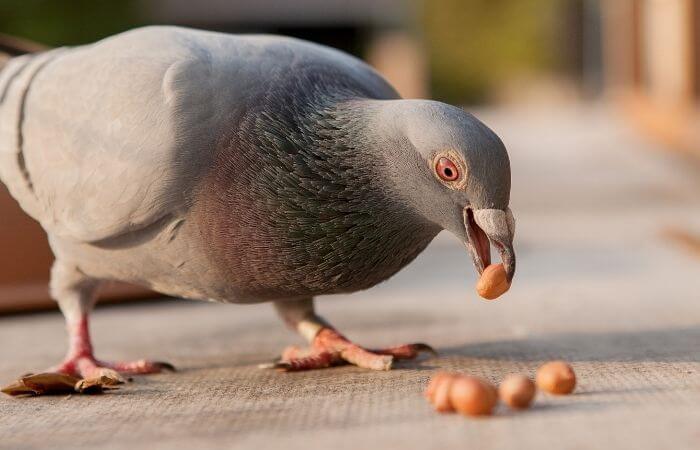Pigeons are no more considered as ‘’flying rats,’’ and gradually, they are regaining their reputation as pet birds. These brilliant birds can adapt quickly and have sharp learning abilities if positive reinforcement is used.
Pigeons also need a balanced diet for their muscle development, cognitive abilities, and good health. You need to be extremely careful about what pigeons eat at each stage of their life, as their nutrition is essential for the health of humans around them. There is a big difference between a pet pigeon diet and a wild pigeon diet.
Pet and wild pigeon diet:
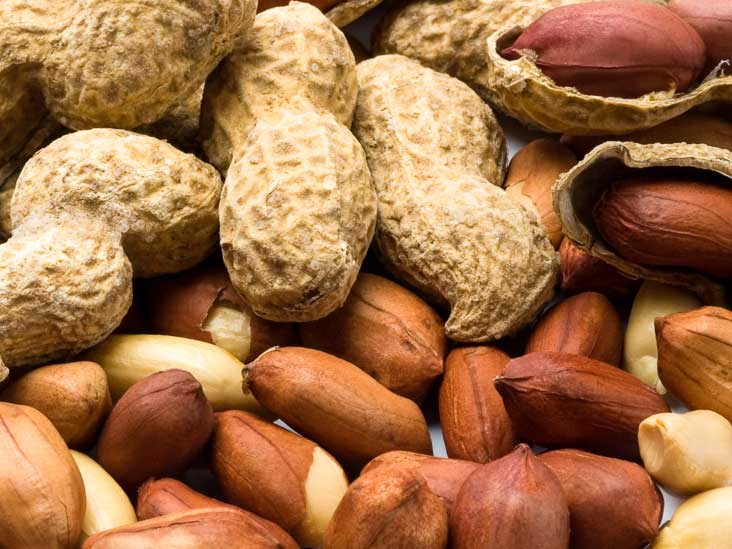
A large part of a pet pigeon’s diet is seeds that you can mix on your own or get a formulated product specially designed for pet pigeons. A good variety of different seeds and grains with some fruits and vegetables is ideal for a pet pigeon.
Wild pigeons spend most of their time scavenging for food. Few seeds and grains which pigeons find and food leftover items in bins and rubbish are their food sources. These wild pigeons consume small insects, earthworms, and earthworms too.
Can pigeons eat peanuts?
Yes! They can.
Pigeons love eating peanuts as a snack that is full of vitamins and minerals. But the point to remember is to feed your pigeons small peanuts (Spanish peanuts) that are fresh, unsalted, and have no added preservatives.
Can pigeons eat human food?
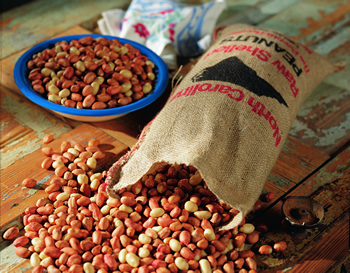
Pigeons can eat human food that is not so native to their natural habitat. In urban areas, pigeons eat almost everything. But if you want them as your pet, train them for racing, or have them as pals, serve them with super healthy foods. It is good to keep your pet pigeon on a natural diet that they eat in the wild. The natural diet of a pigeon provides them energy and nutrients that are beneficial for their health.
Peanuts are beneficial for both humans and pigeons, but still, there is a difference. Adulterated peanuts or processed, salted and preserved peanuts that humans eat are incredibly harmful to pigeons.
Benefits of peanuts for pigeons:
Peanut is a must part of a natural healthy diet for a pigeon. Fruits, nuts, vegetables, and insects are the foods pigeons eat in the wild. Peanuts have high nutritional value for pigeons, and the essential nutrients present in them are:
- Carbohydrates
- Fiber
- Calories
- Fats
- Protein
- Sugar and salt
- Vitamin A & E
- Potassium
- Sodium
- Phosphorus
Peanuts are 45% fat and 24% protein that makes them a perfect blend of macronutrients and are rich in oils to provide high energy to pigeons during cold winter months.
The protein present in peanuts helps to build strong beaks and talons in pigeons. This protein content is also helpful to provide energy to your pet pigeon to fly and walk around.
Other nutrients present in peanuts also provide fuel and energy to the pigeon, boost their flying power, and keep them hydrated. These nutrients provide support to a healthy metabolism, contribute to the better management of pigeon weight, and also improve their liver functioning.
Dangers of peanuts for pigeon:
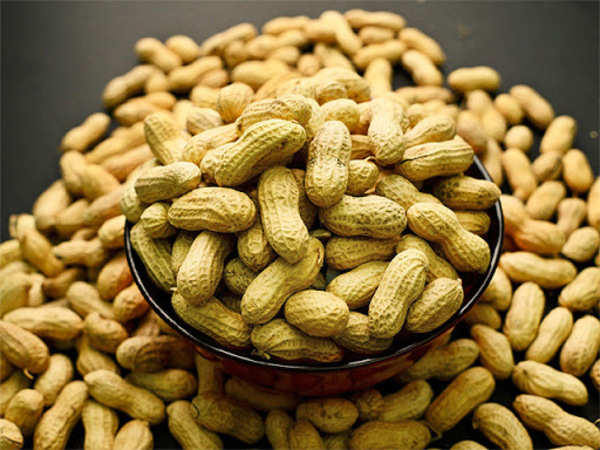
Peanut is considered a healthy food for the power performance of pigeons, but it has some drawbacks and potential dangers also. Peanut size matters a lot for pigeons. Big peanuts can cause choking hazards. Classic-style peanuts are too big for pigeons, so it is better to serve pigeons with Spanish peanuts or grounded classic peanuts.
Always consider the beak size of the pigeon before feeding them peanuts. Larger peanuts with irregular shapes may cause damage to the pigeon’s beak.
NOTE: not only peanuts but any nut with a hard shell and irregular size damages the pigeon’s beak.
Adulterated peanuts for pigeons:
Only fresh and unprocessed peanuts are good for pigeons. Peanuts with added preservatives contain harmful substances that are harmful to the not-so-complicated digestive system of pigeons. Old and stale peanuts may have molds grown on them that contain harmful toxins such as Aflatoxin. These toxins can cause liver damage, cancer, digestive tract infections, and even death.
Roasted peanuts and peanut butter for pigeon:
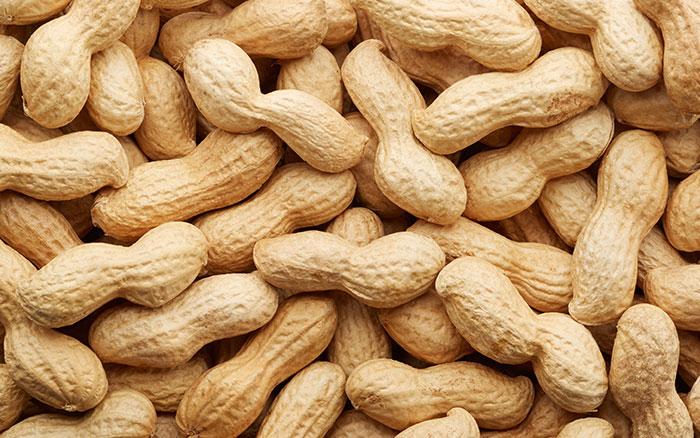
Peanuts are a good source of protein and Vitamin E and some healthy types of fat for pigeons, but only when they are fresh and untreated. A minimal amount of roasted peanuts for human consumption is generally safe for pigeons, but roasting does not destroy Aflatoxin, and the risk is still there.
Peanut butter is a good treat for pigeons with a few additional minerals in it that are good for pigeon’s health. The non-sticky texture of peanut butter also creates no mess in pigeon’s feathers. Try to give only organic peanut butter occasionally as a treat to your pigeon.
NOTE: Bulk peanut products may have been stored under questionable conditions for a long time. They may also have more added preservatives, so it is better to avoid these products.
Peanut oil for pigeon:
Peanut oil is a natural source of energy that is ideal for building extra energy reserves. With a high quantity of essential fatty acids, peanut oil is best for racing pigeons. It has over 30 essential nutrients and phytonutrients that contribute to well being of racing pigeons.
How to give peanuts to a pigeon?
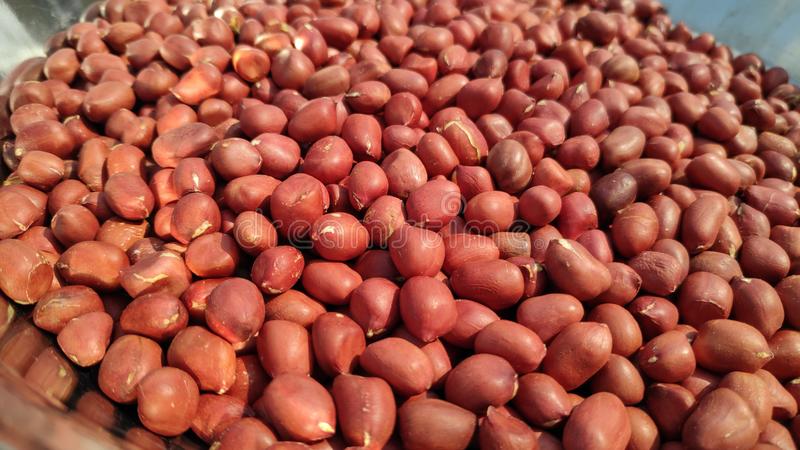
You can give a few whole, raw, or shelled peanuts at a time to your pet pigeon. Take a batch of unsalted and unprocessed raw Spanish peanuts and use these small ground peanuts, even smaller particles, for your pigeon.
Peanut alternatives for pigeons:
Here are a few of the peanut alternatives for pigeons:
- Acorn
- Almond
- Beechnuts
- Brazil nuts
- Hickory nuts
- Macadamia nuts
- Pecans
- Pine nuts
- Sunflower seeds
- Walnuts
Conclusion:
Pigeons can eat peanuts safely, and they are powerful additional energy sources that are essential to keep pigeons healthy and make them faster.
Always choose fresh and untreated peanuts for pigeons. Salted and roasted peanuts with added preservatives can cause digestive issues and improper liver functioning. Use crushed peanuts or select Spanish peanuts that are smaller in size. Big peanuts can damage the beak of your pigeon and also cause choking. Therefore, be careful fellas!
